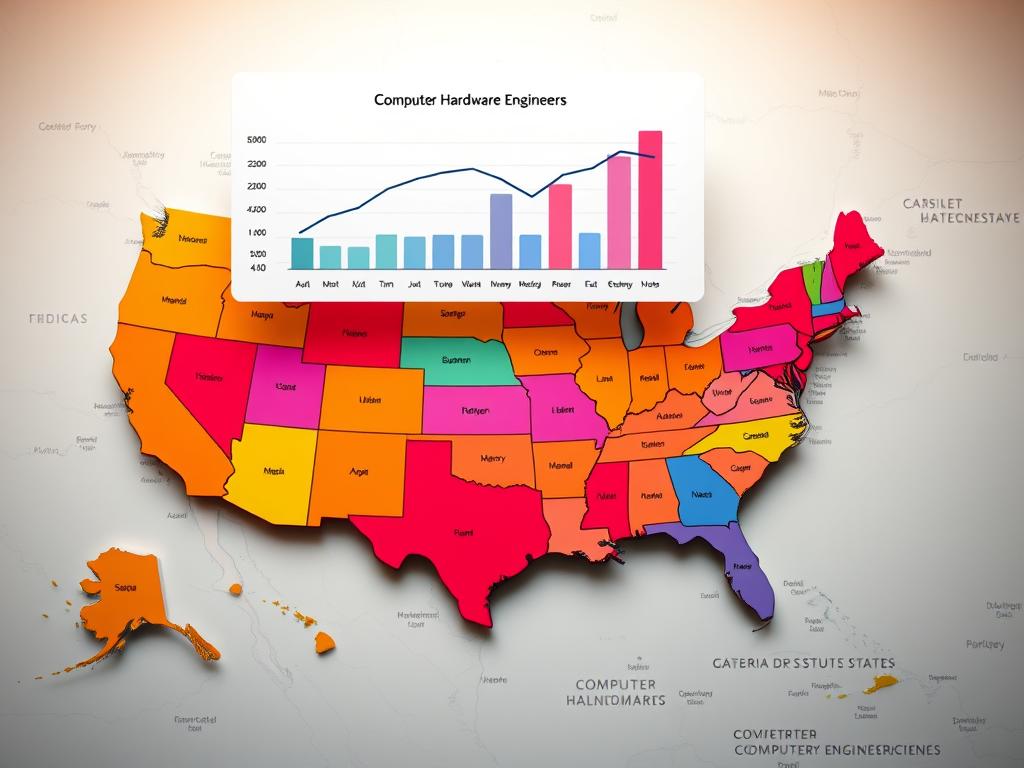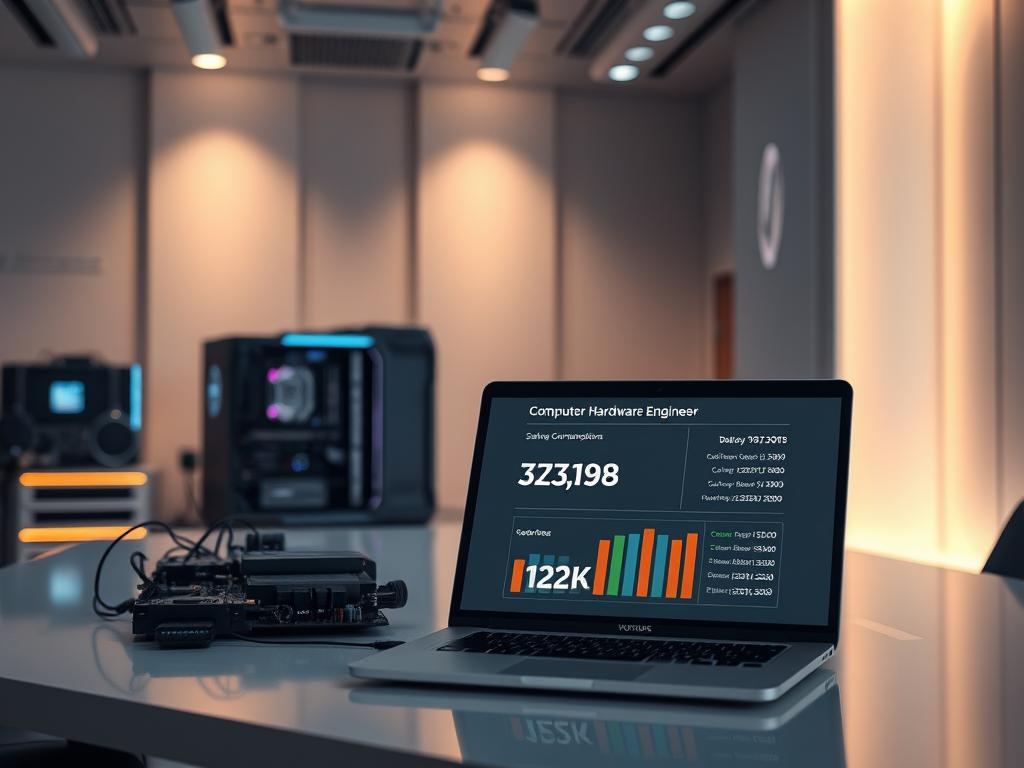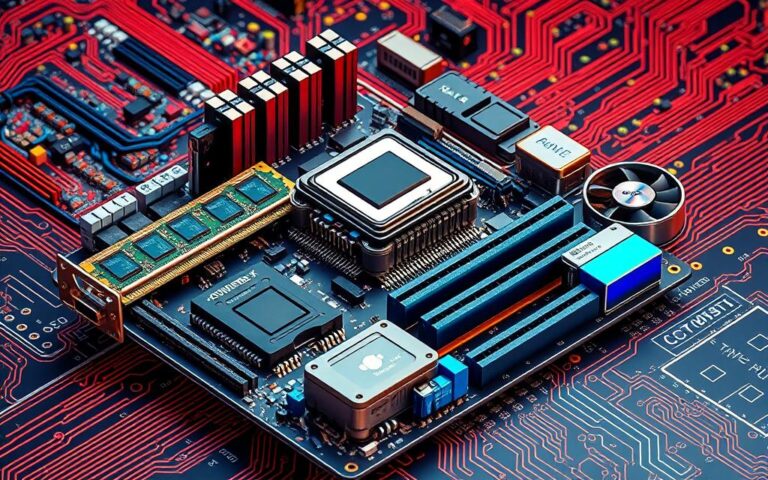Computer Hardware Engineer Salary: How Much Can You Earn?
Computer hardware engineering offers a lucrative career in the tech sector. The median annual salary stands at £138,080. This field rewards specialists for their technical know-how.
Salaries for hardware engineers range from £86,238 to £136,240 yearly. Top performers can earn over £212,770. Glassdoor and the Bureau of Labor Statistics confirm the profession’s strong earning potential.
Several factors shape a hardware engineer’s pay. These include education, industry, and location. Advanced degrees and experience can boost earnings significantly.
Those passionate about tech innovation find this career appealing. It offers both financial rewards and exciting challenges. Let’s delve deeper into the salary landscape for computer hardware engineers.
We’ll explore earning potential and career growth. We’ll also look at the skills needed to excel in this field.
Overview of the Computer Hardware Engineering Profession
Computer hardware engineering is a vital field in technology. It combines innovative design with complex technical expertise. Professionals in this area shape the tech landscape by creating advanced computer systems.
The job requires strong computer engineering qualifications and specialised skills. These go beyond traditional technical knowledge. Aspiring engineers need a wide-ranging skill set to succeed.
Educational Requirements and Qualifications
Successful computer hardware engineers typically have specific educational credentials:
- Bachelor’s degree from an ABET-accredited institution
- Specialisations in computer engineering, electrical engineering, or related fields
- Comprehensive understanding of electronic systems
Key Responsibilities and Skills
Hardware engineers must show exceptional technical abilities:
- Design and develop computer components
- Test and analyse hardware performance
- Create prototype systems
- Collaborate with cross-functional teams
Industry Demand and Growth Prospects
The U.S. Bureau of Labor Statistics predicts steady job growth for computer hardware engineers. From 2021 to 2031, a 5% increase is expected. This growth shows ongoing demand for skilled professionals in the field.
What is the Salary for a Computer Hardware Engineer
Computer hardware engineers design and develop cutting-edge technological solutions. Their salaries reflect the complexity and expertise required in this specialised field.
The pay scale varies significantly across different career stages. Let’s explore the salary ranges for various experience levels.
Entry-Level Salary Range
New hardware engineers can expect a salary between £47,000 and £72,000. The average total compensation is about £58,000.
Base salaries start around £47,000. Potential bonuses range from £390 to £15,200.
- Average total compensation: $76,707
- Base salary starting around $62,000
- Potential bonuses between $515 – $20,000
Mid-Career Salary Range
With experience, hardware engineers’ earnings increase substantially. Mid-career professionals can expect salaries between £72,000 and £97,000.
The median salary is about £70,000 per year. The average total compensation also sits at £70,000.
- Salary range: $94,858 – $128,460
- Median salary: $93,000 per year
- Average total compensation: $93,000
Senior-Level Salary Range
Experienced professionals with advanced skills command higher pay. Senior-level engineers can earn between £97,000 and £122,000.
The average total compensation is about £119,000. Potential profit sharing ranges from £115 to £33,000.
- Salary range: $128,460 – $160,456
- Average total compensation: $157,000
- Potential profit sharing: $151 – $44,000
“The hardware engineering profession offers competitive compensation that reflects the technical expertise and innovation required in this field.”
These figures are based on 179 salary profiles. They offer a comprehensive view of potential earnings in computer hardware engineering.
Top-Paying States for Computer Hardware Engineers

Hardware engineering salaries vary across the United States. Regional differences greatly impact where engineers can find the best-paying jobs.
Several states offer impressive pay for hardware engineers:
- California leads the pack with an extraordinary annual salary of $164,980
- Nevada follows closely at $161,630
- Washington offers competitive earnings at $152,460
- Virginia provides strong compensation at $134,780
- Alaska rounds out the top five with $131,590
These salary differences stem from various factors. Local tech industry concentration and cost of living play crucial roles.
Silicon Valley boosts California’s high rates. Tech hubs in Washington and Nevada contribute to their impressive ranges.
Engineers considering a move should look beyond just salary figures. Living costs and career growth potential are vital considerations in different markets.
Salary is just one component of a comprehensive career strategy for hardware engineers.
Salary Comparison with Related Technical Careers
Engineering pay scales vary across different specialisations in the tech industry. Computer hardware engineers earn competitive salaries that rival other engineering disciplines. Their earnings stand out in the technical job market.
Hardware engineers show impressive earning potential compared to related technical professions. The median salary for computer hardware engineers is $128,170. This places them favourably against several other technical roles.
- Software Developers: Average salary around $110,140
- Electrical Engineers: Median wage approximately $103,390
- Mining and Geological Engineers: Highest earning potential at $137,720
The technical career landscape offers varied compensation packages. Computer hardware engineers enjoy substantial opportunities for career growth and competitive salaries. Their prospects remain strong in the industry.
Several factors influence engineering pay scales. These include specialisation, geographic location, and industry sector. Professionals with advanced skills can expect higher compensation. This is especially true in regions with thriving tech ecosystems.
Factors Affecting Hardware Engineer Salaries
Hardware engineer salaries depend on various factors. These include location, experience, and industry sector. Each element plays a crucial role in shaping compensation.
Understanding hardware engineering salaries requires careful consideration. Multiple elements influence pay in this field. Let’s explore the key factors that affect compensation.
Geographic Location’s Impact
Location significantly affects hardware engineer salaries. Tech hubs like California offer higher pay due to industry concentration. Competitive job markets in these areas drive up wages.
- California offers highest mean wages at £173,270
- Massachusetts follows with £158,070
- Metropolitan areas like San Jose provide top compensation packages
Experience and Expertise Level
Career progression greatly impacts earning potential. As engineers gain experience, their value increases. This leads to higher salaries over time.
| Experience Level | Average Annual Salary |
|---|---|
| 0-1 years | £92,532 |
| 4-6 years | £113,556 |
| 15+ years | £159,968 |
Industry Sector Variations
Different industries offer varying pay for hardware engineers. This reflects the specialised skills needed in each sector. Some industries pay more than others.
- Financial Services: Highest paying at £218,098
- Healthcare: Offers £225,721
- Information Technology: Provides £141,047
Specialisation and continuous skill development are key to maximising earning potential in hardware engineering.
Career Advancement and Salary Growth Opportunities
Hardware engineers must develop skills and learn continuously to advance their careers. They can boost their salaries by mastering new tech like AI and quantum computing. Expertise in advanced semiconductor design is also valuable.
Specialising in embedded systems, circuit design, and product development can increase earning potential. Proficiency in Python, MATLAB, and Perl often leads to higher salaries and better job opportunities.
Smart career moves include taking leadership roles and pursuing advanced certifications. Developing expertise in finance, technology, and manufacturing can also be beneficial. The field’s 7% projected growth offers promising opportunities for adaptable professionals.
Networking and attending industry events are crucial for career progression. Keeping technical skills current is essential. Engineers can unlock significant salary growth by excelling in their field and embracing new trends.
FAQ
What educational qualifications are typically required to become a computer hardware engineer?
Most computer hardware engineers need a bachelor’s degree in computer or electrical engineering. Some jobs may require a master’s degree for advanced research or specialised roles. Industry certifications can boost career prospects.
How does experience impact salary for computer hardware engineers?
Experience greatly affects salary growth. Entry-level engineers start around £56,000, rising to £94,858 mid-career. Senior-level positions with extensive expertise can reach £160,456.
Which states offer the highest salaries for computer hardware engineers?
States with major tech hubs like California, Washington, and Massachusetts offer the highest salaries. These areas have large tech industries and higher living costs. This leads to more competitive pay packages.
What additional skills can help increase a computer hardware engineer’s earning potential?
Key skills include circuit design, embedded systems, and computer architecture. Knowledge of AI and quantum computing is also valuable. Soft skills like project management and problem-solving can boost career opportunities.
How does the salary of a computer hardware engineer compare to other technical professions?
Computer hardware engineers earn salaries similar to software developers and electrical engineers. Exact comparisons vary by location, specialisation, and industry sector. The field offers strong earning potential within tech and engineering.
What career advancement opportunities exist for computer hardware engineers?
Career paths include senior engineering roles, technical management, and research and development positions. Specialising in emerging technologies is another option. Continuous learning and advanced certifications are crucial for career growth.
How do industry sectors affect computer hardware engineer salaries?
Different sectors offer varying pay. Tech companies, aerospace, and research institutions may have different salary ranges. Tech giants and innovative startups often offer more competitive packages than traditional manufacturing industries.
What factors should be considered when negotiating a computer hardware engineer salary?
Key negotiation factors include market rates, expertise, and specific technical skills. Company size, location, and benefits like stock options are also important. Research industry standards thoroughly before negotiating.















